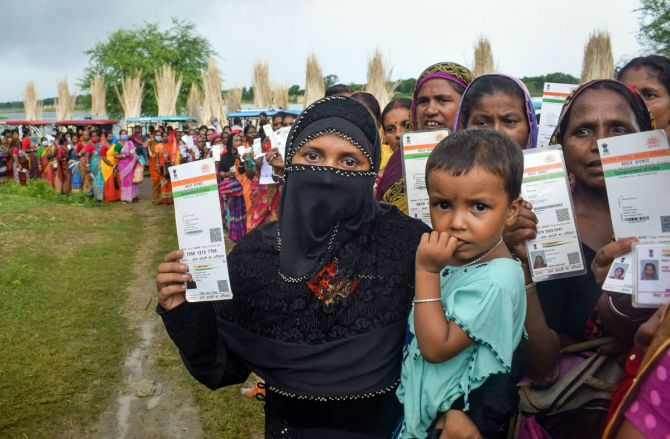It is our only chance of avoiding a repeat of our catastrophic second wave, asserts Naushad Forbes.

Who has handled the Covid pandemic well? Lockdowns, masking and social distancing to limit the spread of infection have been our daily experience since early 2020.
Effective treatment can limit the death rate.
And the most likely exit from the pandemic is through vaccination.
All three metrics -- infections, deaths and vaccination -- need to be factored by population to compare one country with another.
So all data in this article is per million population as of August 1, 2021.
Our final goal must be a return to normalcy in our lives with acceptable levels of risk.
States vary enormously in their death rates.
Places that acted early and hard such as Australia (death rate, 36 per million) and Taiwan (33) did so much better than the United States (1,850), Brazil (2,620) and the UK (1,915).
But states also vary enormously in how quickly they have vaccinated their populations.
The US, UK, Israel, the UAE and now much of Europe have well over half their population fully vaccinated.
East and South-East Asia, meanwhile, have fumbled with getting shots into arms.
Most high vaccination countries seem to also have high death rates.
And very few places with low death rates have high vaccination rates.
Where do we go from here?
What should a country with a high death rate do? Vaccinate like mad.
In India's case, this should be the government's number one priority.
It would show in the most capable people in government running the vaccination campaign, orders in place for vaccines (both domestic and international) for a multiple of our population (my understanding is that we are still only halfway there), and a daily review of progress at the highest level of government.
It is our only chance of avoiding a repeat of our catastrophic second wave.
The government has repeatedly committed full vaccination by the end of the year, but we are achieving only half the rate that achieving this goal demands.
Our ambition and effectiveness must match the immensity of the task.
Oscar Wilde once said there was this world, and then there was the next, and then there was New Zealand.
But surely even New Zealand has some intention of rejoining the world.
Australia has just won the bid to host the 2032 Olympics in Brisbane; when I saw the news report, my comment was that I hoped it would be open by then.
Administering just 18 and 24 per cent of the shots needed in such rich countries with tiny populations and effective public health systems should be a national disgrace.
Singapore was my favourite positive exception.
It both effectively controlled infections/deaths and has been running an effective vaccination programme, fully covering over 65 per cent of the population.
Three ministers proposed in The Straits Times in July that Covid be treated as endemic, to be lived with and handled, instead of a pandemic to be controlled.
Track deaths and critical care capacity rather than infections, they said.
Two weeks later, reacting solely to a rise in infections, severe restrictions on movement were reimposed. (There has since been some relaxation.)
The other outlier in combining a control of infections with high vaccination is China.
But after foisting the virus on the world in the first place and giving it its greatest health challenge in a century, I struggle to consider it a model for anything.
Needed: Global Leadership
So as of August 2021, my answer to the question, 'Who has handled the pandemic well?' is 'No one'.
What must we do to have a different answer by the end of this calendar year? Three things: Vaccination, international coordination of a return to normalcy, and statesmanship to carry our fellow citizens along with us.
Vaccination
As many have said, we are safe only when we are all safe.
The longer we delay immunising the world, the greater the opportunity for the virus to mutate and breakthrough the immunity vaccines provide.
As The Economist correctly pointed out, the G7 in its recent meeting signally failed both morally and economically in delivering a plan to vaccinate all 7 billion people in the world now.
The economic return to vaccination is so huge it isn't worth calculating.
The cost of fully vaccinating India is less than half the fall in just one tax (GST) in just one month (April 2020).
It would seem to be a no-brainer -- except for the many brains that seem to miss it!
When President Joe Biden invited the leaders of Japan, Australia and India to the Quad Summit in March, one of the key initiatives was a vaccination programme for much of Asia: The US would provide the technology for vaccines, India would make them, and Japan and Australia would pay for them.
Why have we heard nothing further since?
What has happened in the three months since a senior official made a trip to the USA apparently specifically to obtain vaccines for us?
Yes, things take time, but the longer we delay and fumble, the more we keep the world at risk.
Coordinated opening up will take several moves
Start with agreed travel norms. Every country seems to have its own requirements, instead of reflecting international understanding of health needs.
Vaccine passports have been proposed to bring about a more agreed approach.
Why is India opposing this sensible idea?
Why is the USA open to travel from Colombia and Thailand but not Europe or India, when the current infection rates say the opposite makes sense?
Flight restrictions must be removed so airlines can decide for themselves where to fly to, and with what capacity.
Why is India one of the only countries in the world not to have restored normal air travel arrangements?
Seventeen months after restrictions were imposed, we continue with so-called 'bubble arrangements' with individual countries.
Is this for health reasons? Or to protect Air India from competition?
Opening the UK up apparently went beyond what people wanted -- polls said 60 per cent were against it.
But it has opened up only domestically, so is it aiming to catch up with the normal life and movement of Europe or the isolated existence of Australia?
Singapore needs to turn the forward-looking proposal of its ministers last month into actual policy.
It is otherwise placing at risk a major source of its prosperity if expats relocate themselves and their businesses to countries that are more hospitable to travel.
Statesmanship
In my book, a statesman is a political leader who does the right thing even if it isn't immediately popular.
When countries face crises, they need their leaders to act in the national interest that only later proves to be right.
An international crisis of the magnitude of our global health pandemic requires that leaders act in the wider interest of humanity. It is high time we did.
Naushad Forbes is co-chairman, Forbes Marshall, past president, CII, chairman of Centre for Technology Innovation and Economic Research and Ananta Aspen Centre.
Feature Presentation: Aslam Hunani/Rediff.com












 © 2025
© 2025